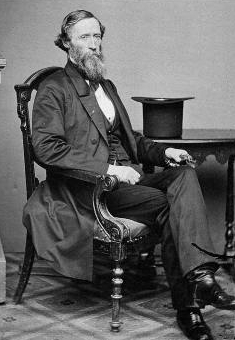John Blair Smith Todd facts for kids
Quick facts for kids
John Blair Smith Todd
|
|
|---|---|
 |
|
| Born | April 4, 1814 Lexington, Kentucky |
| Died | January 5, 1872 (aged 57) Yankton County, Dakota Territory |
| Place of burial |
Yankton City Cemetery, Yankton, South Dakota
|
| Allegiance | United States of America Union |
| Service/ |
United States Army Union Army |
| Years of service | 1837–1856, 1861–1862 |
| Rank | |
| Battles/wars | Seminole Wars Mexican–American War -Siege of Veracruz -Battle of Cerro Gordo< American Civil War |
| Other work | Delegate from Dakota Territory to the United States House of Representatives |
John Blair Smith Todd (born April 4, 1814 – died January 5, 1872) was an important figure in American history. He served as a representative for the Dakota Territory in the United States House of Representatives. He was also a general in the Union Army during the American Civil War.
Contents
Early Life and Family Connections
John Todd was born in Lexington, Kentucky. His family moved to Illinois in 1827 when he was 13 years old.
He had a famous family connection: his first cousin was Mary Todd Lincoln. She was the wife of Abraham Lincoln, who became the 16th President of the United States. This made John Todd a cousin-in-law to President Lincoln. Another cousin-in-law was Benjamin Hardin Helm, who became a general for the Confederate side during the Civil War.
Becoming a Soldier
In 1837, John Todd graduated from the United States Military Academy at West Point, New York. This is a famous school for training army officers. After graduating, he joined the 6th U.S. Infantry.
He quickly became a first lieutenant in December 1837. He served in the Seminole Wars from 1837 to 1840. These wars were conflicts between the United States Army and the Seminole people in Florida. He also helped with recruiting new soldiers in 1841 and returned to active duty in Florida until 1842.
Military Service and Frontier Life
In 1843, John Todd was promoted to captain. He worked on the frontier, which was the edge of settled areas, in places like Indian Territory and Arkansas.
Fighting in the Mexican-American War
He fought in the Mexican–American War in 1847. This was a conflict between the United States and Mexico. He took part in important battles like the Siege of Veracruz and the Battle of Cerro Gordo.
After the war, he continued to serve in the army. He was stationed at different forts until 1855. He also took part in a battle against the Sioux Native Americans at Blue Water.
Leaving the Army and New Beginnings
John Todd decided to leave the United States Army on September 16, 1856. He then became an Indian trader, which meant he traded goods with Native American tribes. He settled in Fort Randall, which was in the Dakota Territory.
In 1861, he became a lawyer and started practicing law in Yankton.
Return to Military Service in the Civil War
When the American Civil War began, John Todd rejoined the army. On September 19, 1861, he was made a brigadier general of Volunteers. He was in charge of the North Missouri district for a few months. However, he resigned from the Army again on July 17, 1862.
Political Career in Dakota Territory
After his military service, John Todd became involved in politics. He was chosen to represent the Dakota Territory in the United States House of Representatives.
He served in the 37th and 38th United States Congress. As a member of the Democratic Party, he represented the Dakota Territory from December 9, 1861, to March 3, 1863. He was reelected and served again from June 17, 1864, to March 3, 1865.
After his time in Congress, he returned to Yankton. He continued to be active in local politics. He served as the speaker of the territorial House of Representatives in 1866 and 1867. He tried to run for Congress again in 1868 but was not chosen.
Later Life and Legacy
John Todd passed away in Yankton County on January 5, 1872. He is buried in the Yankton Cemetery.
Two counties are named after him: Todd County, South Dakota and Todd County, Minnesota. This shows his lasting impact on the region.
 | Percy Lavon Julian |
 | Katherine Johnson |
 | George Washington Carver |
 | Annie Easley |

